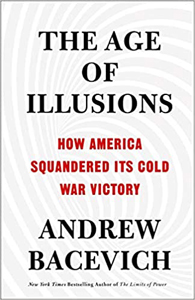 Andrew Bacevich, The Age of Illusions: How America Squandered Its Cold War Victory (New York: Metropolitan Books, 2020), 236pp.
Andrew Bacevich, The Age of Illusions: How America Squandered Its Cold War Victory (New York: Metropolitan Books, 2020), 236pp.
With the fall of the Berlin Wall in 1989 and the collapse of the Soviet Union in 1991, the standard wisdom of our establishment elites was that the West had won, and won big. The United States was hailed as the "sole super power" and the "indispensable nation." We had reached what Francis Fukuyama (in)famously called "the end of history" and the triumph of western neoliberal capitalism as the only viable political system for all of humanity.
It was a period of "euphoric optimism." Confident that anything was possible, our political elite crafted what Andrew Bacevich calls a new consensus or "operating system" that consisted of four elements — wealth creation for all through globalized neoliberalism (cf. NAFTA), global leadership that spread American values throughout the world by military hegemony ("Iraq will greet us as liberators"), personal freedom construed as unlimited and unmoored autonomy, and then presidential supremacy that granted that office "quasi-monarchial prerogatives." Reagan, Bush senior and junior, both of the Clintons, Obama, and all the rest can be seen as interchangeable parts in this consensus. To question this new orthodoxy guaranteed your insignificance.
The last thirty years have shown this cheery consensus to be painfully naive and "irretrievably defective," says Bacevich, fraught with all sorts of hubris, contradictions, and delusions — like runaway deficits, institutional racism, gun violence, grotesque income inequality, endless wars, technological dystopia, environmental degradation, climate change, and dysfunctional government.
The reason why Trump won the election in 2016 was because he was the only one of twenty-three candidates who told the truth about the "abject failure" of this political consensus. He then tapped into the rage of ordinary citizens who might not articulate the failures of the political consensus but who bore the brunt of its worst effects; he became a "champion of the aggrieved." He was not the cause of all our turmoil, but an effect. Bacevich even argues that Trump, however deplorable, is a distraction and a side show, and that by being obsessed with his many failures we have missed the bigger, deeper, and grimmer picture, "the tragedy unfolding on a grander scale." Trump merely "embodied and laid bare the accumulating contradictions of American life."
Aggravating all of this are the "hyperbolic promises" that our politicians feed us, which promises are impossible to fulfill. Bacevich begins his book with a quote from James Baldwin's Notes of a Native Son: "In America, life seems to move faster than anywhere else on the globe and each generation is promised more than it will get: which creates, in each generation, a furious bewildering rage, the rage of people who cannot find solid ground beneath their feet." He concludes on his very last page with Edmund Burke in 1756: "The great error of our nature is not to know where to stop, and thereby to lose all that we have gained by an insatiable pursuit after more." So, the question remains: can we move beyond our understandable but misplaced scapegoating of Trump, and a defunct view of our role in the world, in order to craft an understanding of what it means to be American in the post-Cold War period?
Dan Clendenin: dan@journeywithjesus.net


